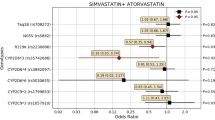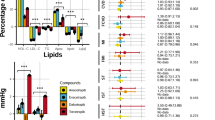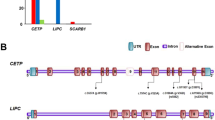Abstract
Statins (HMG-CoA reductase inhibitors) lower low-density lipoprotein cholesterol (LDL-C) and prevent cardiovascular disease. However, there is wide individual variation in LDL-C response. Drugs targeting proprotein convertase subtilin/kexin type 9 (PCSK9) lower LDL-C and will be used with statins. PCSK9 mediates the degradation of LDL receptors (LDLRs). Therefore, a greater LDL-C response to statins would be expected in individuals with PCSK9 loss-of-function (LOF) variants because LDLR degradation is reduced. To examine this hypothesis, the effect of 11 PCSK9 functional variants on statin response was determined in 669 African Americans. One LOF variant, rs11591147 (p.R46L) was significantly associated with LDL-C response to statin (P=0.002). In the three carriers, there was a 55.6% greater LDL-C reduction compared with non-carriers. Another functional variant, rs28362261 (p.N425S), was marginally associated with statin response (P=0.0064).The effect of rs11591147 was present in individuals of European ancestry (N=2388, P=0.054). The therapeutic effect of statins may be modified by genetic variation in PCSK9.
This is a preview of subscription content, access via your institution
Access options
Subscribe to this journal
Receive 6 print issues and online access
$259.00 per year
only $43.17 per issue
Buy this article
- Purchase on Springer Link
- Instant access to full article PDF
Prices may be subject to local taxes which are calculated during checkout

Similar content being viewed by others
References
Mozaffarian D, Benjamin EJ, Go AS, Arnett DK, Blaha MJ, Cushman M et al. Heart disease and stroke statistics—2015 update: a report from the American Heart Association. Circulation 2015; 131: e29–e322.
Nordestgaard BG, Chapman MJ, Ray K, Borén J, Andreotti F, Watts GF et al. Lipoprotein(a) as a cardiovascular risk factor: current status. Eur Heart J 2010; 31: 2844–2853.
Cholesterol Treatment Trialists’ (CTT) Collaboration, Baigent C, Blackwell L, Emberson J, Holland LE, Reith C et al. Efficacy and safety of more intensive lowering of LDL cholesterol: a meta-analysis of data from 170,000 participants in 26 randomised trials. Lancet 2010; 376: 1670–1681.
Cholesterol Treatment Trialists’ (CTT) Collaborators, Mihaylova B, Emberson J, Blackwell L, Keech A, Simes J et al. The effects of lowering LDL cholesterol with statin therapy in people at low risk of vascular disease: meta-analysis of individual data from 27 randomised trials. Lancet 2012; 380: 581–590.
Ridker PM, Danielson E, Fonseca FAH, Genest J, Gotto AM, Kastelein JJP et al. Rosuvastatin to prevent vascular events in men and women with elevated C-reactive protein. N Engl J Med 2008; 359: 2195–2207.
Pearson TA, Laurora I, Chu H, Kafonek S . The lipid treatment assessment project (l-tap): a multicenter survey to evaluate the percentages of dyslipidemic patients receiving lipid-lowering therapy and achieving low-density lipoprotein cholesterol goals. Arch Intern Med 2000; 160: 459–467.
Simon JA, Lin F, Hulley SB, Blanche PJ, Waters D, Shiboski S et al. Phenotypic predictors of response to simvastatin therapy among African-Americans and Caucasians: the Cholesterol and Pharmacogenetics (CAP) Study. Am J Cardiol 2006; 97: 843–850.
Wei WQ, Feng Q, Jiang L, Waitara MS, Iwuchukwu OF, Roden DM et al. Characterization of statin dose-response within electronic medical records. Clin Pharmacol Ther 2013; 95: 331–338.
Goldstein JL, Brown MS . The LDL receptor. Arterioscler Thromb Vasc Biol 2009; 29: 431–438.
Goldstein JL, Brown MS . A century of cholesterol and coronaries: from plaques to genes to statins. Cell 2015; 161: 161–172.
Kovanen PT, Bilheimer DW, Goldstein JL, Jaramillo JJ, Brown MS . Regulatory role for hepatic low density lipoprotein receptors in vivo in the dog. Proc Natl Acad Sci USA 1981; 78: 1194–1198.
Dubuc G, Chamberland A, Wassef H, Davignon J, Seidah NG, Bernier L et al. Statins upregulate PCSK9, the gene encoding the proprotein convertase neural apoptosis-regulated convertase-1 implicated in familial hypercholesterolemia. Arterioscler Thromb Vasc Biol 2004; 24: 1454–1459.
Chen SN, Ballantyne CM, Gotto AM, Tan Y, Willerson JT, Marian AJ . A common PCSK9 haplotype, encompassing the E670G coding single nucleotide polymorphism, is a novel genetic marker for plasma low-density lipoprotein cholesterol levels and severity of coronary atherosclerosis. J Am Coll Cardiol 2005; 45: 1611–1619.
Chernogubova E, Strawbridge R, Mahdessian H, Mälarstig A, Krapivner S, Gigante B et al. Common and low-frequency genetic variants in the PCSK9 locus influence circulating PCSK9 levels. Arterioscler Thromb Vasc Biol 2012; 32: 1526–1534.
Cohen JC, Boerwinkle E, Mosley TH, Hobbs HH . Sequence variations in PCSK9, low LDL, and protection against coronary heart disease. N Engl J Med 2006; 354: 1264–1272.
Global Lipids Genetics Consortium. Discovery and refinement of loci associated with lipid levels. Nat Genet 2013; 45: 1274–1283.
Kathiresan S, Willer CJ, Peloso GM, Demissie S, Musunuru K, Schadt EE et al. Common variants at 30 loci contribute to polygenic dyslipidemia. Nat Genet 2009; 41: 56–65.
Kotowski IK, Pertsemlidis A, Luke A, Cooper RS, Vega GL, Cohen JC et al. A spectrum of PCSK9 alleles contributes to plasma levels of low-density lipoprotein cholesterol. Am J Hum Genet 2006; 78: 410–422.
Shioji K, Mannami T, Kokubo Y, Inamoto N, Takagi S, Goto Y et al. Genetic variants in PCSK9 affect the cholesterol level in Japanese. J Hum Genet 2004; 49: 109–114.
Turnbull C, Perdeaux ER, Pernet D, Naranjo A, Renwick A, Seal S et al. A genome-wide association study identifies susceptibility loci for Wilms tumor. Nat Genet 2012; 44: 681–684.
Waterworth DM, Ricketts SL, Song K, Chen L, Zhao JH, Ripatti S et al. Genetic variants influencing circulating lipid levels and risk of coronary artery disease. Arterioscler Thromb Vasc Biol 2010; 30: 2264–2276.
Willer CJ, Sanna S, Jackson AU, Scuteri A, Bonnycastle LL, Clarke R et al. Newly identified loci that influence lipid concentrations and risk of coronary artery disease. Nat Genet 2008; 40: 161–169.
Wu Y, Waite LL, Jackson AU, Sheu WH-H, Buyske S, Absher D et al. Trans-ethnic fine-mapping of lipid loci identifies population-specific signals and allelic heterogeneity that increases the trait variance explained. PLoS Genet 2013; 9: e1003379.
Berge KE, Ose L, Leren TP . Missense mutations in the PCSK9 gene are associated with hypocholesterolemia and possibly increased response to statin therapy. Arterioscler Thromb Vasc Biol 2006; 26: 1094–1100.
Anderson JM, Cerda A, Hirata MH, Rodrigues AC, Dorea EL, Bernik MMS et al. Influence of PCSK9 polymorphisms on plasma lipids and response to atorvastatin treatment in Brazilian subjects. J Clin Lipidol 2014; 8: 256–264.
Chasman DI, Giulianini F, MacFadyen J, Barratt BJ, Nyberg F, Ridker PM . Genetic determinants of statin-induced low-density lipoprotein cholesterol reduction—the justification for the use of statins in prevention: an intervention trial evaluating rosuvastatin (JUPITER) trial. Circ Cardiovasc Genet 2012; 5: 257–264.
Crawford DC, Goodloe R, Brown-Gentry K, Wilson S, Roberson J, Gillani NB et al. Characterization of the Metabochip in diverse populations from the International HapMap Project in the Epidemiologic Architecture for Genes Linked to Environment (EAGLE) project. Pac Symp Biocomput 2013: 188–199.
Voight BF, Kang HM, Ding J, Palmer CD, Sidore C, Chines PS et al. The Metabochip, a custom genotyping array for genetic studies of metabolic, cardiovascular, and anthropometric traits. PLoS Genet 2012; 8: e1002793.
Roden DM, Pulley JM, Basford MA, Bernard GR, Clayton EW, Balser JR et al. Development of a large-scale de-identified DNA biobank to enable personalized medicine. Clin Pharmacol Ther 2008; 84: 362–369.
Postmus I, Trompet S, Deshmukh HA, Barnes MR, Li X, Warren HR et al. Pharmacogenetic meta-analysis of genome-wide association studies of LDL cholesterol response to statins. Nat Commun 2014; 5: 5068.
Peissig P, Sirohi E, Berg RL, Brown-Switzer C, Ghebranious N, McCarty CA et al. Construction of atorvastatin dose-response relationships using data from a large population-based DNA biobank. Basic Clin Pharmacol Toxicol 2007; 100: 286–288.
Wilke RA, Berg RL, Linneman JG, Zhao C, McCarty CA, Krauss RM . Characterization of low-density lipoprotein cholesterol-lowering efficacy for atorvastatin in a population-based DNA biorepository. Basic Clin Pharmacol Toxicol 2008; 103: 354–359.
Stein EA . Extending therapy options in treating lipid disorders: a clinical review of cerivastatin, a novel HMG-CoA reductase inhibitor. Drugs 1998; 56 (Suppl 1): 25–31, discussion 33.
Patterson N, Price AL, Reich D . Population structure and eigenanalysis. PLoS Genet 2006; 2: e190.
Price AL, Patterson NJ, Plenge RM, Weinblatt ME, Shadick NA, Reich D . Principal components analysis corrects for stratification in genome-wide association studies. Nat Genet 2006; 38: 904–909.
Purcell S, Neale B, Todd-Brown K, Thomas L, Ferreira MA, Bender D et al. PLINK: a tool set for whole-genome association and population-based linkage analyses. Am J Hum Genet 2007; 81: 559–575.
Kathiresan S, Melander O, Guiducci C, Surti A, Burtt NP, Rieder MJ et al. Six new loci associated with blood low-density lipoprotein cholesterol, high-density lipoprotein cholesterol or triglycerides in humans. Nat Genet 2008; 40: 189–197.
Teslovich TM, Musunuru K, Smith AV, Edmondson AC, Stylianou IM, Koseki M et al. Biological, clinical and population relevance of 95 loci for blood lipids. Nature 2010; 466: 707–713.
Guella I, Asselta R, Ardissino D, Merlini PA, Peyvandi F, Kathiresan S et al. Effects of PCSK9 genetic variants on plasma LDL cholesterol levels and risk of premature myocardial infarction in the Italian population. J Lipid Res 2010; 51: 3342–3349.
Cohen J, Pertsemlidis A, Kotowski IK, Graham R, Garcia CK, Hobbs HH . Low LDL cholesterol in individuals of African descent resulting from frequent nonsense mutations in PCSK9. Nat Genet 2005; 37: 161–165.
R Development Core Team. R: A language and environment for statistical computing. [Internet]. R Foundation for Statistical Computing. 2010, Available from http://www.R-project.org.
LaVange LM, Koch GG . Rank score tests. Circulation 2006; 114: 2528–2533.
Lakoski SG, Lagace TA, Cohen JC, Horton JD, Hobbs HH . Genetic and metabolic determinants of plasma PCSK9 levels. J Clin Endocrinol Metab 2009; 94: 2537–2543.
Lambert G, Ancellin N, Charlton F, Comas D, Pilot J, Keech A et al. Plasma PCSK9 concentrations correlate with LDL and total cholesterol in diabetic patients and are decreased by fenofibrate treatment. Clin Chem 2008; 54: 1038–1045.
Abifadel M, Varret M, Rabès J-P, Allard D, Ouguerram K, Devillers M et al. Mutations in PCSK9 cause autosomal dominant hypercholesterolemia. Nat Genet 2003; 34: 154–156.
Mayne J, Dewpura T, Raymond A, Cousins M, Chaplin A, Lahey KA et al. Plasma PCSK9 levels are significantly modified by statins and fibrates in humans. Lipids Health Dis 2008; 7: 22.
Benn M, Nordestgaard BG, Grande P, Schnohr P, Tybjaerg-Hansen A . PCSK9 R46L, low-density lipoprotein cholesterol levels, and risk of ischemic heart disease: 3 independent studies and meta-analyses. J Am Coll Cardiol 2010; 55: 2833–2842.
Humphries SE, Neely RDG, Whittall RA, Troutt JS, Konrad RJ, Scartezini M et al. Healthy individuals carrying the PCSK9 p.R46L variant and familial hypercholesterolemia patients carrying PCSK9 p.D374Y exhibit lower plasma concentrations of PCSK9. Clin Chem 2009; 55: 2153–2161.
Kathiresan S, Myocardial Infarction Genetics Consortium. A PCSK9 missense variant associated with a reduced risk of early-onset myocardial infarction. N Engl J Med 2008; 358: 2299–2300.
Dewpura T, Raymond A, Hamelin J, Seidah NG, Mbikay M, Chrétien M et al. PCSK9 is phosphorylated by a Golgi casein kinase-like kinase ex vivo and circulates as a phosphoprotein in humans. FEBS J 2008; 275: 3480–3493.
Thompson JF, Hyde CL, Wood LS, Paciga SA, Hinds DA, Cox DR et al. Comprehensive whole-genome and candidate gene analysis for response to statin therapy in the treating to new targets (TNT) cohort. Circ Cardiovasc Genet 2009; 2: 173–181.
Polisecki E, Peter I, Simon JS, Hegele RA, Robertson M, Ford I et al. Genetic variation at the NPC1L1 gene locus, plasma lipoproteins, and heart disease risk in the elderly. J Lipid Res 2010; 51: 1201–1207.
Press Announcements—FDA approves Praluent to treat certain patients with high cholesterol [Internet]. [cited 26 July 2015]. Available from http://www.fda.gov/NewsEvents/Newsroom/PressAnnouncements/ucm455883.htm.
Acknowledgements
This study was supported by GM109145, UL1 RR024975, P50GM115305, U19HL065962, U01HL069757 and K23AR064768. This study was also supported by AHA 16SDG27490014. The data set(s) used for the analyses described were obtained from Vanderbilt University Medical Center's resources, BioVU and the Synthetic Derivative, which are supported by institutional funding and by the Vanderbilt National Center for Advancing Translational Science grant 2UL1 TR000445-06 from NCATS/NIH. Existing genotypes in BioVU were funded by NIH grants RC2GM092618 from NIGMS/OD and U01HG004603 from NHGRI/NIGMS.
Author information
Authors and Affiliations
Corresponding author
Ethics declarations
Competing interests
The authors declare no conflict of interest.
Additional information
Supplementary Information accompanies the paper on the The Pharmacogenomics Journal website
Supplementary information
PowerPoint slides
Rights and permissions
About this article
Cite this article
Feng, Q., Wei, W., Chung, C. et al. The effect of genetic variation in PCSK9 on the LDL-cholesterol response to statin therapy. Pharmacogenomics J 17, 204–208 (2017). https://doi.org/10.1038/tpj.2016.3
Received:
Revised:
Accepted:
Published:
Issue Date:
DOI: https://doi.org/10.1038/tpj.2016.3
This article is cited by
-
Genetic contribution to lipid target achievement with statin therapy: a prospective study
The Pharmacogenomics Journal (2020)
-
GENetic characteristics and REsponse to lipid-lowering therapy in familial hypercholesterolemia: GENRE-FH study
Scientific Reports (2020)
-
The Knowns and Unknowns of Contemporary Statin Therapy for Familial Hypercholesterolemia
Current Atherosclerosis Reports (2020)
-
The association of the PCSK9 rs562556 polymorphism with serum lipids level: a meta-analysis
Lipids in Health and Disease (2019)
-
PGxO and PGxLOD: a reconciliation of pharmacogenomic knowledge of various provenances, enabling further comparison
BMC Bioinformatics (2019)



